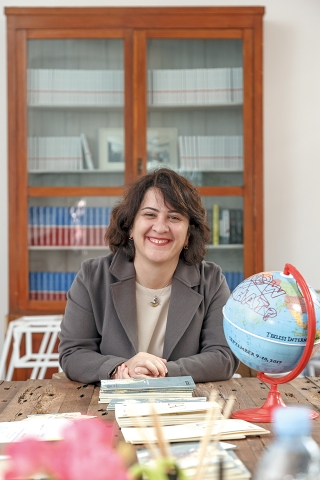Economic Policy Research Center Celebrates 17 Years
The Economic Policy Research Center (EPRC), which just celebrated 17 years of operation on November 4, is a leading economic think and do tank in Georgia striving to promote sustainable development by focusing its activities on such issues as Georgia’s Euro-Atlantic integration, strengthening evidence-based policy making, rule of law, ensuring safety and security, and educating groups and the population in general.
The organization was founded in 2002 by young individuals studying in top universities abroad. David Chkadua, Kakha Ugulava, Nino Evgenidze and Giorgi Chiladze are among the founding members.
Just before the Rose Revolution, where Georgia was bound by a high level of corruption and enticement, a think tank like EPRC was needed to respond to these challenges. Georgia in 2002 had a reputation as a ‘failed state’, and so the EPRC group sought to be a research and case-based knowledge institution to examine and apply economic and technical aid to Georgia’s internal policies and companies.
The EPRC is mainly funded through international donor organizations, taking no money from the government so as not to jeopardize its impartiality. The non-profit NGO is ranked high in the transparency index, having received a 5-star rating, and is included in the top 20.
We had the privilege of sitting down with Nino Evgenidze, the Executive Director of EPRC, to discover what this organization entails and to learn about some of its most successful projects.
“Our defense of democracy is crucial, because we are in the vicinity of Russia’s misinformation and fabrications while the European countries have institutions to counter act,” Evgenidze tells us. “The EPRC takes on the role of upholding Georgian democracy and the country’s further integration with the West.”
The reason the West offers overwhelming support for Georgia is because the country is a flagship for democracy on the ‘frontline’ and a regional beacon for it. “The fight for liberty and defense of democracy is a collective fight,” Evgenidze notes.
Evidence-based policymaking and appliance are key affairs for EPRC. The center has a diverse set of projects and initiatives, one of which is the creation of the Fukuyama Democracy Frontline Center which just celebrated its first year anniversary. The project aims to merge the fundamental values of democracy, rule of law and liberal international order. These values have been vital to peace and stability, both of which are central to the EPRC group.
Professor Fukuyama, Mosbacher Director of the Center on Democracy, Development and the Rule of Law (CDDRL) at Stanford University, is overseeing the Fukuyama Center board. David Kramer, Senior Fellow at Florida International University, serves as the director.
It has been one year since the Fukuyama Center started functioning. Strong institutions, democratic principles and rule of law are crucial for building a free modern nation, which is inherently important for Georgia.
The center has translated books by Professor Fukuyama, Senator John McCain and Professor Larry Diamond and David Kramer, and has distributed copies among Georgian universities countrywide. This helps to raise awareness on evaluating the risks the world is facing and gives information on how to tackle them. These endeavors are precisely aimed at younger generations.
“Georgia is not that fortunate to have enormous amounts of natural resources to enter big markets, therefore the key is internationalization of services,” Evgenidze says, going on to advocate for strengthening the focus towards such spheres as architecture, design and business consulting.
GEclose2EU, which is another project implemented by the EPRC, is funded by the Swedish government, as part of which 65 companies representing architecture, business consulting and ICT sectors were selected from a large pool through an open call competition. From the winning companies, 24 organizations are oriented toward architecture-design, 15 are from ICT and 26 are business consulting firms.
The companies will benefit from technical assistance initiatives supporting them to internationalize and develop. Training sessions and seminars are also being prepared for the winning companies, and at the beginning of 2020, they will be sent to Sweden for a study tour. Overall technical aid will be given to about 100 SMEs. The project is implemented in partnership with the Enterprise Georgia Agency. Various tools, among them an online platform tradewithgeorgia.com, are utilized to popularize Georgian companies on the world’s market.
It is of high importance to support SMEs since they are backbones of economy through job creation and economic wellbeing, which in turn serves as a guarantee for democracy. A strong and stable middle class is the assurance of development and democracy.
Sweden is one the leading nations in successfully implementing a social-democratic system, where small and medium enterprises prosper. GEclose2EU serves exactly this purpose, to train and stimulate Georgian SME owners. “We have to give companies opportunities and knowledge, funding alone is not enough,” says Evgenidze.
Participant companies must detail what exact technical assistance they need and why, and describe how this will assist them in development and internationalization perspectives in the future.
As part of the project, a media tour was organized for Georgian journalists to Sweden. They had a chance to meet with the high official representatives from public, private and non-governmental sectors.
The EPRC prides itself on being an organization with long - standing experience. It has positioned itself as a civil society leader working on the issues of Georgia’s Euro-Atlantic integration and providing impartial analysis of its current and projected socio-economic outcomes. Multiple analytical pieces, delivered by the EPRC, in partnership with national and international actors, has earned the organization a reputation as a reliable source of information on a wide range of issues at the heart of the Europeanization discourse. Through promoting evidence-based policymaking, the EPRC strives to improve the business and investment environment in the country, in particular for SMEs.
By Beka Alexishvili












